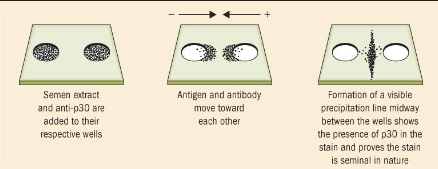College Forensics - Serology
1/62
There's no tags or description
Looks like no tags are added yet.
Name | Mastery | Learn | Test | Matching | Spaced |
|---|
No study sessions yet.
63 Terms
Serology
Examination and analysis of body fluids
Blood Characteristics
Plasma (55%), Cells (red, white, platelets) (45%), Serum
Erythrocytes
Red blood cells - responsible for oxygen distribution
Leukocytes
White blood cells - responsible for fighting off infection/”invaders”
Thrombocytes
Platelets - responsible for blood clotting
Plasma
The fluid portion of the blood
Karl Landsteiner
Around 1900, ________________________ discovered that there are four different types of human blood based on the presence or absence of specific antigens found on the surface of the red blood cells.
Landsteiner, Weiner
In 1940, ______________ and ________ reported the discovery of the Rh factor by studying the blood of the Rhesus monkey.
ABO Blood Groups
Based on having an A, B, both or no antigens on red blood cells
Rh factor
May be present on red blood cells; positive if present and negative if not
Antigen
a substance that can stimulate the body to make antibodies. Certain antigens (proteins) found in the plasma of the red blood cell’s membrane account for blood type.
Antibody
a substance that reacts with an antigen
Agglutination
Clumping of red blood cells; will result if blood types with different antigens are mixed
Genotype
A pair of alleles
Phenotype
Outward physical expression of the genes
Unknown stain questions
Is it blood?
Is it human blood?
Whose is it?
Determine blood type, alcohol content, drugs present
Determine the method(s) in which blood may have been deposited
Type A
________ has antigen A on the surface of the cell and will agglutinate with blood type B.
Type B
________ has antigen B on the surface of the cell and will agglutinate with blood type A.
Type AB
__________ has antigens A and B on the surface of the cells and will not agglutinate with either type A or B blood (because no antibodies).
Type O
___________ has neither antigen A nor B and will not agglutinate.
Type O
Universal donor, most common
Type AB
Universal acceptor, least common
Presumptive Tests
____________ ______ has following characteristics:
1) It is sensitive and specific to heme.
2) It is reliable, stable, economically feasible to use, and relatively non-toxic.
3) It is able to meet the Frye standard of general acceptance to the relevant scientific community.
4) It is non-destructive to evidence (A presumptive test shouldn't be the last test you can perform.)
5) It is non-destructive to the crime scene.
Kastle-Meyer Test
a mixture of phenolphthalein and hydrogen peroxide; the hemoglobin will cause the formation of a deep pink color if blood is present since blood contains peroxidases.
Note: This test is a presumptive or preliminary test for blood; meaning that it is not definite. Other testing must be done to determine if the substance is truly blood.
Note: Substances other than blood may produce the pink color change (potatoes & horseradish)—this is called a false positive result. (Sensitive but not very specific)
Luminol Test
a reaction with blood to produce light; extremely sensitive & doesn’t interfere with DNA testing
Benzidine
has been phased out, because it is a known carcinogen- turned blue
Hemastix
has been found to be very useful by field investigators—a dipstick moistened with distilled water is placed in contact with the suspect blood— reacts with the heme group causing a green color change that indicates a positive result
No nucleus
Red blood cells are the most numerous in blood and have __ ______.
Nucleus
White blood cells are the second most common cell found in blood. Have a _______.
Animal blood
Have larger red blood cells than humans that may have a nucleus
Precipitin Test
human blood is injected into a rabbit; antibodies are formed; the rabbit’s blood is extracted as an antiserum; the antiserum is placed on sample blood. The sample will react (& precipitate) with human proteins if human blood is present.
**This test is very sensitive and requires only a small amount of blood.
Scene pattern reconstruction
1. Stain condition
2. Pattern
3. Distribution
4. Location
5. Directionality
Conditions affecting the shape of a blood drop
Size of the droplet
Angle of impact
Velocity at which the blood droplet left its origin
Height
Texture of the target surface
On clean glass or plastic—droplet will have smooth outside edges
On a rough surface—will produce scalloping on the edges
Answered by blood splatter interpretation
The distance between the target surface and the origin of blood
The point(s) of origin of the blood
Movement and direction of a person or an object
The number of blows, shots, etc. causing the bloodshed and/or the dispersal of blood.
Type and direction of impact that produced the bloodshed
The position of the victim and/or object during bloodshed
Movement of the victim and/or object after bloodshed
Round
The shape of a blood drop is ________ if it falls straight down at a 90 degree angle.
Ellipitcal
The shape of a blood drop is _______ blood droplets elongate as the angle decreases from 90 to 0 degrees
Area of Convergence
The location of the blood source can be determined by drawing lines from the various blood droplets to the point where they intersect.
The point of origin.
Backspatter
blood that is directed back toward the source of energy
Bubble rings
Rings in blood that result when blood containing air bubbles dries and retains the bubble's circular configuration as a dried outline.
Draw-back
Blood in the barrel of a firearm that has been drawn backwards into the muzzle.
Expired blood
Blood that is blown out of the nose, mouth or a wound as a result of air pressure and/or air flow which is the propelling force.
Flight path
The path of the blood drop, as it moves through space, from the impact site to the target.
Misting
Blood which has been reduced to a fine spray, as a result of the energy or force applied to it.
Ricochet
The deflection of blood after impact with a target surface that results in staining of a second target surface.
Satellite Spatter
Small droplets of blood that are distributed around a drop or pool of blood as a result of the blood impacting the target surface.
Spine
The pointed or elongated stains which radiate away from the central area of a bloodstain
Semen
The forensic examination of _________ is a two-step process:
First, the _________ must be located
Second, tests must be performed to prove its identity—it may even be tested for blood type
Note: ________ is checked for blood type because many individuals are secretors
Secretors
80% of individuals are classified as _________
This means that their blood-type antigens are also found in high concentrations in most body fluids
Acid phosphatase
_______ __________ is an enzyme secreted by the prostate gland into seminal fluid that is in far greater concentrations than those found in any other body fluids.
Acid phosphatase test
1. Contact with a special acidic solution and fast blue B dye shows a color change
2. Contact with a solution of MUP fluoresces under UV light.
Large areas or fabrics can be quickly searched by moistening filter paper with the detector solutions and rubbing over the suspect area
Some substances will give a false-positive result (fruit juices, contraceptive creams, and vaginal secretions), but none of these substances will react with the speed of seminal fluid.
Note: A reaction of less than 30 seconds is a strong indication of semen.
Microscopic Examination of Sperm
Rapid stirring of a fabric-stain-water mixture will transfer a small amount of sperm into the water. A drop is then taken, dried, stained and looked at under the microscope.
Problems with sperm
1. Sperm are very brittle when dried and easily disintegrate. They are also hard to remove from cloth material.
2. Sexual crimes may involve males who have an abnormally low sperm count, condition called oligospermia.
3. Or males who have no sprem in their seminal fluid, condition called aspermia—often due to increasing numbers of vasectomies.
Collection of Rape Evidence
Outer and undergarments are placed in separate paper bags while victim stands on a piece of paper. The paper is then folded and collected.
Bedding or the object upon which assault took place should be submitted to the lab.
Rape vicitim must be subjected to a medical examintion. Collected items include pubic hairs, vaginal swabs, blood, fingernail scrapings, clothing and urine)
Suspect must also undergo an exam. Routine items collected include clothing, hairs, penile swab and blood samples
Arterial Spurting (Gushing)
Bloodstain pattern(s) resulting from blood exiting the body under pressure from a breached artery.
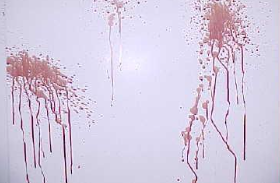
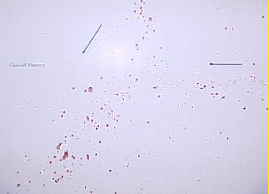
Cast off Pattern
A bloodstain pattern created when blood is released or thrown from a blood-bearing object in motion
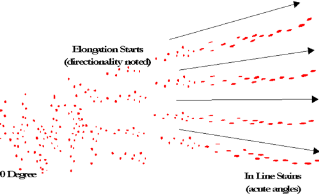
Flow Pattern
A change in shape and direction of a bloodstain due to the influence of gravity or movement of the object.
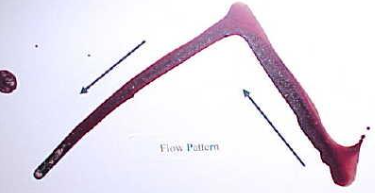
Low Velocity Impact Spatter
A bloodstain pattern that is caused by a low velocity impact/force to a blood source. Large stains (4mm or greater)
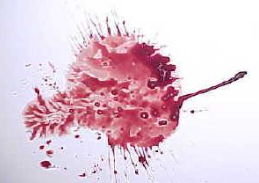
High Velocity Impact Spatter
Caused by a high velocity impact/force to a blood source such as that produced by gunshot or force resulting in the random dispersion of smaller drops of blood. (1 mm or smaller)
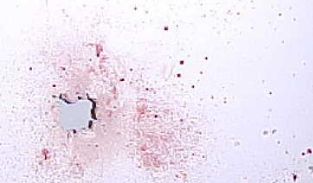
Swipe pattern
Wet blood is transferred to a surface which did not have blood on it. Direction of travel may be determined by the feathered edge.
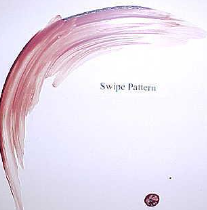
Contact/Transfer Pattern
Created when a wet, bloody surface comes in contact with a second surface. A recognizable image of all or a portion of the original surface may be observed in the pattern.
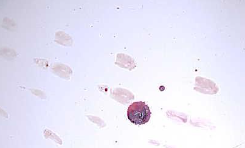
Wipe Pattern
A non-blood bearing object moves through a wet bloodstain, altering the appearance of the original stain
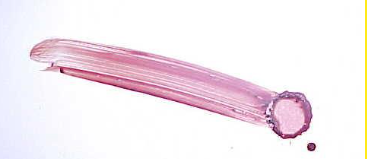
Passive Drops
Blood that drips off an object- example bloody knife, bloody nose
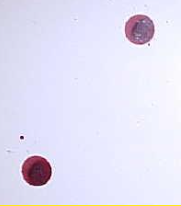
p30 prostate specific antigen test
Formation of a visible line between the wells of anti p-30 and semen extract–proves the stain is seminal
